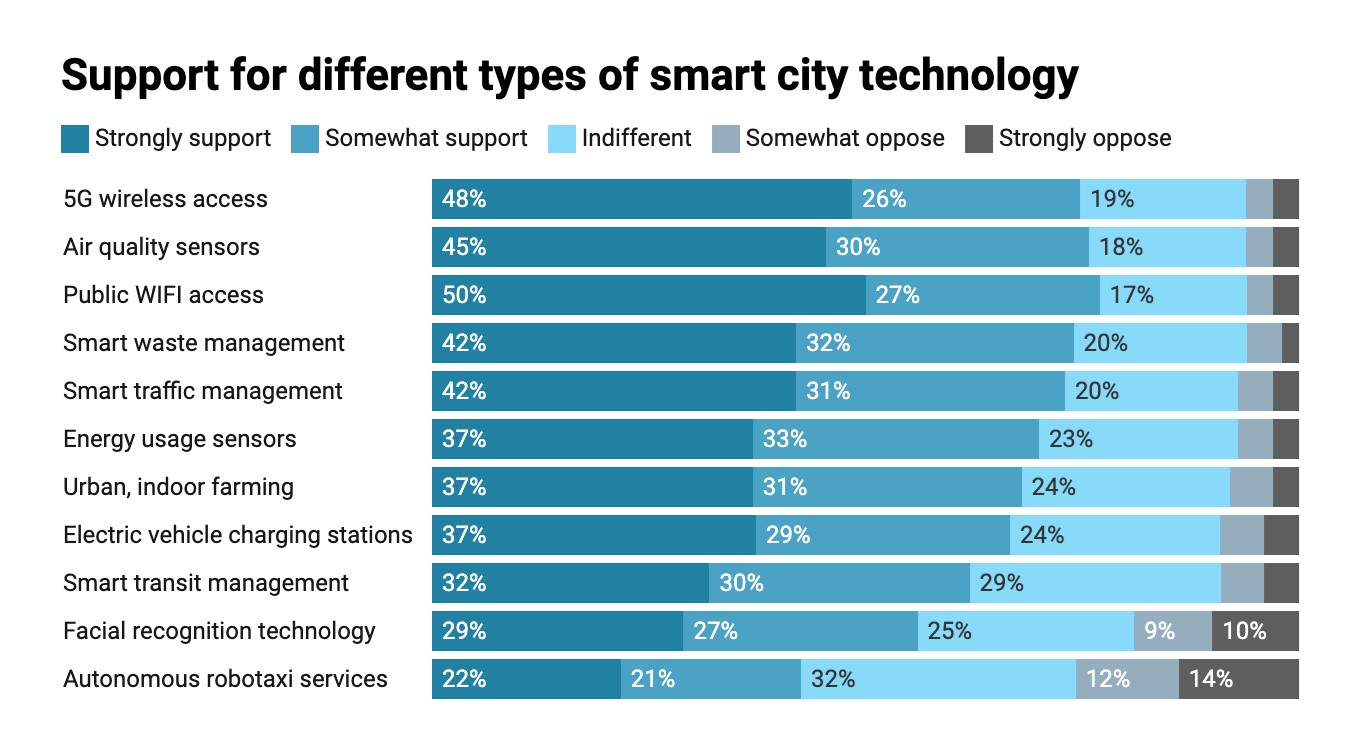Data
WHAT THE DATA SAY: Americans want more 5G and traffic tech – not autonomous taxis
By: Ray Day
CONTACT:
We wanted to share our latest consumer and business insights, based on research from The Harris Poll, a Stagwell agency.
Among the highlights of wave 141 (fielded Nov. 4-6) in our weekly consumer sentiment tracking:
ECONOMY, INFLATION WORRIES TICK BACK UP:
Today, 88% of Americans are concerned about the economy, inflation and jobs – up 2 points from last week. Worries about affording living expenses, in particular, jumped significantly.
-
- 84% worry about a potential U.S. recession (up 1 point)
- 88% about the economy and inflation (up 2 points)
- 84% about U.S. crime rates (up 2 points)
- 76% about affording their living expenses (up 4 points)
- 75% about political divisiveness (up 1 point)
- 72% about the War on Ukraine (no change)
- 59% about a new COVID-19 variant (down 3 points)
- 48% about losing their jobs (down 6 points)
- 44% about the Monkeypox outbreak (down 4 points)
AMERICANS REGRET NOT SWITCHING JOBS SOONER:
Job seekers regret not starting their job searches sooner, as layoffs and freezes in tech threaten to expand to other sectors, according to our survey with Bloomberg.
-
- 71% of those looking to switch jobs say the job search today is more complicated than anticipated.
- 63% say they’ve searched for a new job for more than six months, and 48% report applying to more than 50 positions.
- 72% of job seekers say that companies are acting like they don’t want to hire, including ignoring applications and failing to schedule interviews.
- 66% say they regret not starting the search sooner, while 63% admit it would have been easier to switch jobs a year or two ago.
- 51% of job seekers agree that, at this point, they would take nearly any job offer.
TWITTER: A TALE OF MANY VIEWS:
In light of Elon Musk’s Twitter takeover, we find both critics and fans – something brands might want to remember as they consider pausing spending on the platform, according to our survey with USA Today.
-
- Female (63%) Twitter users are less likely to support Musk’s ownership than men (70%).
- Gen Z users also are more likely to believe Musk will hurt Twitter’s product quality (53%), freedom of the press (44%) and free speech on the internet (37%) compared with older users.
- Both women (28% willing) and Gen Z (35%) would be less willing to pay a monthly subscription fee than men (44%) and Millennials (53%).
- Yet 67% of Twitter users support Musk owning Twitter, especially Republicans (79%), parents with minor children (74%), urban residents (72%), men (70%) and Millennials (70%).
- 84% of Americans find free speech on social media important, and the majority of Republicans (57%), men (56%), rural (55%) and white Americans (53%) find it “very important.”
- Frequent Twitter users, including Republicans (42% versus Democrats at 32%), Millennials (40% versus Gen Z at 26%), men (36% versus women at 26%) and Black Americans (36% versus white at 32%) say they’ll now spend more time on the platform that Musk owns it (versus all Twitter users at 31%).
AMERICANS SAY SMART CITIES DON’T NEED AUTOMOUS TAXIS:
In partnership with Emerging Tech Brew, we found that 87% of city residents found it essential for their city to invest in emerging technologies – but not every resident supports each tech initiative equally.
-
- Most intelligent city technologies – such as public WiFi access, 5G wireless access, smart traffic management, facial recognition technology and air quality sensors – has solid support from city residents. The exception is autonomous robotaxi services, which less than half support (43%).
- Overall, Gen Z and Millennial city residents report being more aware of smart city tech, as well as much more likely to use the tech weekly compared to older residents (Gen Z 44% and Millennials 51% versus Gen X 37% and Boomers 16%).
- Those in cities with metro areas of less than 1 million tend to view such tech as less critical than their larger-city counterparts.
- Smaller-city residents also are less likely to view their cities as particularly innovative, with just 16% saying they find their city very innovative, compared to 43% for larger cities.
- 48% of Boomers said they never use smart city tech, while 27% of Gen X respondents said the same.
- That compares with only 13% of Millennials and 7% of Gen Z who say they never use smart city tech.
ICYMI:
In case you missed it, check out some of the thought-leadership and happenings around Stagwell making news:
As always, if helpful, we would be happy to provide more info on any of these data or insights. Please do not hesitate to reach out.
|
|
Thank you.
Related
Articles
In the News, Press Releases, Thought Leadership
Jun 10, 2025
Stagwell (STGW) Chairman and CEO Mark Penn to Discuss the Irreplaceable Power of Human Creativity on the Main Stage of Cannes Lions

Events, In the News, Press Releases, Talent & Awards
Jun 05, 2025
Code and Theory Named ANA B2B Agency of the Year After Transforming the World’s Leading Brands

In the News, Press Releases, Talent & Awards
May 19, 2025
Stagwell (STGW) Appoints Connie Chan as Chief Growth Officer for Asia Pacific






